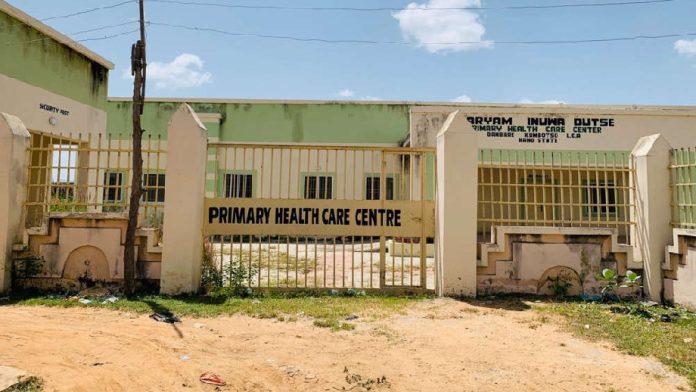In Kano State, the lack of well-equipped primary healthcare centers in remote areas contributes significantly to high maternal and child mortality rates. This healthcare disparity leaves vulnerable populations at risk, highlighting the urgent need for investment in rural health facilities to save lives
Pregnant women in Kano rural areas still travel over 30 kilometers on tricycles to overburdened health facilities during labor despite the deadly consequences.
Their journeys are not unconnected to the 6:00 pm daily closing time of the health facilities in their communities. In addition, the facilities are challenged with inadequate infrastructure and facilities. This often forces the women to choose between giving birth at home and taking the dangerous journey to a secondary facility in the metropolitan areas.
Sa’a Haqibu died in June 2023 after enduring 10 hours of labor at home and losing a lot of blood. The former resident of Hawan Dawaki town in Danbare, Kumbotso Local Government Area of Kano State, birthed a male child before passing away. At the time, her husband, Haqibu Isa, could not take her to Danbare Health Clinic in the community as the nurses closed around 4:00 pm the day she went into labor.
Haqibu told this reporter how his wife’s body bloated up due to the complications she developed during childbirth, eventually dying 40 days later.
Sa’a Haqibu died in June 2023 after enduring 10 hours of labor at home and losing a lot of blood
“After she started bleeding, we took her to the hospital, and the bleeding stopped. After some days, she began to swell up, and I took her to the hospital, and they said her blood pressure (BP) was high. After 40 days, we lost her,” he said.
Just like Sa’a, Safiya Ibrahim revealed how her friend died during childbirth in September 2024 under a Traditional Birth Attendant’s (TBA) care.
“Just a few days ago, my neighbor lost her life during labor. It was really sad because this would have been prevented if all was well in our facility.”
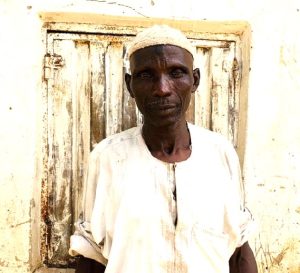
Sa’a and Maryam’s cases are just a few of the hundreds of expectant mothers dying during or after childbirth, according to the chairman of Danbare Ward Development Committee (WDC), Ibrahim Garba.
“We have lost our wives and sisters because they could not get the needed services here. Some died on their way to a facility outside this community, while others died before even leaving here. Sometimes, we lose both the mother and the baby,” he said.
Mallam Garba further lamented that the communities had written to the authorities, but the condition of the facility remains the same.
“We have written to the state government, the local government authorities, and our representatives at the federal and state levels, but nothing has been done to resolve our plight,” Garba said.
For his part, the Ward Head of Hawan Dawaki B, Awaisu Kasim Hawan-Dawaki, revealed that the facility’s lack of essential equipment is forcing expectant mothers to travel to Tofa Comprehensive Health Center, about 23 kilometers away, during childbirth. He urged the state government to upgrade the facility to serve the community 24 hours daily.
We have written to the state government, the local government authorities, and our representatives at the federal and state levels, but nothing has been done to resolve our pligh
“We are pleading with the government to employ more staff so that the facility will work for 24 hours to address these emergencies,” Awaisu said.
The ward head also revealed that a few years ago, Maryam Inuwa Dutse Primary Health Care Center was constructed with 15 bed spaces in the community to halt the inter-LGA travels during labor. Unfortunately, it was abandoned after completion.
“They constructed a new healthcare center for us, but they are yet to bring the equipment to the facility. So, we are pleading with them to do the needful,” he pleaded.
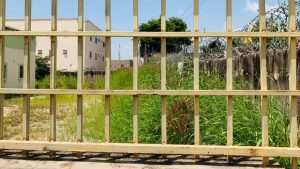
The facility was under lock and key and bushy when our correspondent visited Danbare in October 2024; but the situation is more dire at Dan Jirima Health Post in Watari community.
Constructed over two decades ago, the facility is run without a water source, as the staff resort to buying a gallon of water daily to cater to patients. It is without a functioning toilet, which makes workers and patients rush to neighboring houses whenever nature calls.
Worse, the facility is in a state of disrepair with visible cracks on the walls. About a year ago, all the drugs in the facility were stolen at night, as the facility is run without a security guard.
Understaffed with four workers and ill-equipped with one bed, the health facility can only admit one patient at a time. Despite its state, pregnant women from Kuyan Ta Inna, Kuyan Ta Sidi, Marone, Damfani, Yar Mariya, and many nearby villages visit Dan Jirima for antenatal care and immunization.
Understaffed with four workers and ill-equipped with one bed, Dan Jirima Health Post in Watari community can only admit one patient at a time
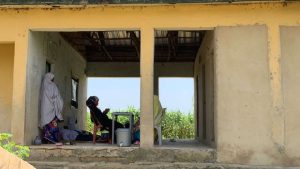
One of such expectant mothers, Abu Nura, who had three of her children at home, says the facility does not take delivery; hence, her reason for delivering at home. “Most of the women in this community either give birth in a hospital in Kabuga or give birth at home. Out of my six children, I gave birth to three at home,” she said.
The situation is not peculiar to Kumbotso Local Government. At Gayawa community in Ungogo Local Government, pregnant women prefer to give birth at home with the assistance of traditional birth attendants. However, the women often face complications due to prolonged labor and when that happens, they are usually transported on tricycles to Murtala Muhammad Hospital or Abdullahi Wase General Hospital in the metropolis.
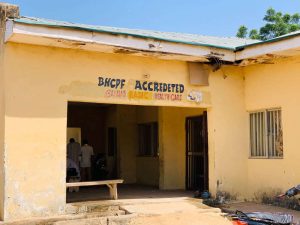
Gayawa Basic Healthcare Clinic, the only facility in the community, lacks basic amenities and works for just nine hours daily. Fatima Abubakar, a lucky resident of the community, endured 10 hours of labor on August 20, 2024 after her water broke at night. Unfortunately, Fatima could not get the needed care at Gayawa Healthcare Clinic as the nurses had closed by 6:00 pm.
She narrates how she almost lost her life due to the complications she developed and the excruciating pain she experienced after she gave birth at home.

“My water broke around 10:00 p.m., and my husband could not get a tricycle at that time because our road was in very bad shape. So, we had to wait at home till morning. After losing a lot of blood, I eventually gave birth at home in the morning before we later went to Murtala Mohammad Hospital,” she said.
Also in 2023, Naziru Idris Ahmed Gayawa’s newborn baby was injured in the head after his wife gave birth in a tricycle when her water broke. Although the baby was eventually treated at Khalipa Isiyaku Rabi’u Paediatric Hospital, Idris believes that his baby could have been prevented from the harsh realities if the facility worked for 24 hours.
Naziru Idris Ahmed Gayawa’s newborn baby sustained head injury when his wife gave birth in a tricycle
“After my wife gave birth in a tricycle, we went to the hospital, and the doctors said the baby was fine. Later at night, he began to shake, and we rushed him to the Murtala Muhammad Hospital, and the doctors confirmed that he was injured in the head.
“They then referred us to Khalipa Isiyaku Rabi’u Paediatric Hospital, where he was admitted and treated.”
However, the District Head of Gayawa, Bashir Mukhtari Saleh, laments that the lack of 24-hour service by the facility is claiming lives in the community.
“From 6:00 p.m., if you have a sick patient, you will have to wait till the next day or leave to where you can access healthcare services,” Saleh explained.
Deeply disturbed by the state of the health clinic in his community, he urged the state government to employ more staff to run the clinic for 24 hours.
Nurse-patient ratio
Kano State has only 1,200 nurses and midwives to attend to thousands of expectant mothers daily. It was reliably gathered that about 400 nurses and midwives, out of the 1,200 nurses and midwives in the state, will retire from active service between September and December 2024.
Nigeria loses about 2,300 under five children and 145 women of childbearing age daily -NPHCDA
A source at the National Association of Nigeria Nurses and Midwives (NANNM), who spoke on the condition of anonymity, confirmed the development.
Meanwhile, most of these facilities also fall short of the national standards of Primary Healthcare Post. According to the National Primary Health Care Development Agency (NPHCDA), a standard primary health care post must have two standard rooms, netted windows, functional toilet facilities, adequate clean water sources, and constant electricity, and the health post must be fenced.
Pregnancy-related complications and maternal mortality
In 2020, the World Health Organization (WHO) estimated that 82,000 Nigerian women died due to pregnancy-related complications. The causes of death included severe hemorrhage, high blood pressure, unsafe abortion, and obstructed labor.
A report it released on May 9, 2023, titled ‘Improving maternal and newborn health and survival and reducing stillbirth: Progress report 2023,’ shows that more than 50,000 women die during childbirth in Nigeria every year.
Kano State tops the list of maternal mortality with a staggering 1,025 deaths per 100,000 live births
According to UNICEF, Nigeria’s 40 million women of childbearing age (15 to 49) suffer a disproportionally high level of health issues surrounding childbirth due to the lack of access to healthcare services.
Under-five mortality
Also, on September 24, 2024, the Executive Director of the National Primary Health Care Development Agency (NPHCDA), Dr. Muyi Aina, said Nigeria loses about 2,300 under five children and 145 women of childbearing age daily.
Sadly, most of these deaths are occurring in northern Nigeria, with Kano State topping the list with a staggering 1,025 deaths per 100,000 live births, despite the state government’s commitment to addressing infant and maternal deaths.
Apart from inadequate infrastructure and lack of manpower, some of these women skip prenatal check-ups during pregnancy as they choose traditional healers and often don’t resort to seeking professional medical help until it is too late.
Kano passes FMNCH Bill into law
Fortunately, the Kano State House of Assembly passed the long-awaited Free Maternal and Child Healthcare (FMNCH) Bill into law on May 3, 2023 to halt the high rate of maternal and child mortality in the state.
We are happy that the FMNCH law was signed into law, but the challenge now is its actualization in the state
The law mandates the state to provide free maternal and child-related services. It also provides free care to newborns and infants for a minimum of one year and a maximum of 59 months, amongst others.
Unfortunately, the FMNCH Law has not been fully actualized 17 months later.
Commenting on the development, the Executive Director of the Resource Center for Human Rights and Civic Education CHRICED, Dr. Ibrahim Zikirullahi, stressed the scourge of infant and maternal deaths in Kano.
According to him, “About 80 percent of deaths during childbirth are preventable.” Seeing this as a challenge, CHRICED launched a new project on October 17, 2024, tagged ‘Promotion of Democratic Participation in Nigeria: Social Accountability in the Implementation of Free Maternal and Child Healthcare Law,’ aimed at actualizing the FMNCH Law in the state.”
Comrade Zikirullahi believes maternal deaths would have been minimal if the state government fully implements the FMNCH Law.
“We are happy that the FMNCH law was signed into law, but the challenge now is its actualization in the state. We believe that once it is actualized, it will halt these avoidable deaths in the state,” he said.

Over 70% of Kano mothers prefer giving birth at home -Health Commissioner
When contacted, the Kano State Commissioner for Health, Dr. Abubakar Labaran Yusuf, expressed dismay that women in the state continue to suffer from excessive bleeding after childbirth due to the refusal of about 70 percent of them to attend antenatal services.
According to him, research findings by the ministry indicate that over 70% of women in the state prefer giving birth at home, despite the risks involved.
He said, “This administration revived the free maternal and child health program to address these avoidable deaths, but only 30 percent of the women attend the free antenatal services.”
Kano residents, especially in rural areas, are hoping for concerted efforts that would guarantee access to 24-hour service delivery at PHCs across the state, regardless of location
Dr. Labaran disclosed that many women avoid hospitals for antenatal care and delivery, which increases health risks for both mother and child; adding that “it is sad that you only see them during complicated labor.”
The Health Commissioner stressed that lack of prenatal planning often leads to complications, sometimes resulting in untimely deaths, just as he says these challenges are frequent in remote areas. However, Dr. Labaran clarified that the study’s figures differ from the ministry’s official statistics. “We are currently compiling our annual report, which will provide more accurate data,” he said.
On the dilapidated nature of healthcare centers in the state, the commissioner said the state government had embarked on the statewide renovation of some of the facilities and employment of some health workers to make them more convenient and conducive for deliveries.
According to him, once completed, “these facilities will work for longer hours,” he said.
However, while these efforts are commendable, Kano residents, especially in rural areas, are hoping for concerted efforts that would guarantee access to 24-hour service delivery at PHCs across the state regardless of location.
Source: NigeriaInfo Online

